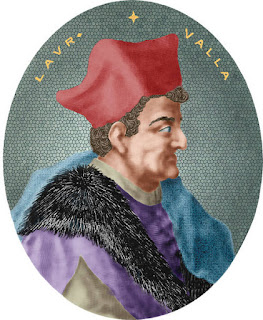The Donation (an action represented in the illustration) was an alleged decree from Roman Emperor Constantine I in the 4th century, offering to Pope Sylvester control over all the major dioceses and all the lands of the empire, both East and West. This was proven to be a forgery in the 15th century by the scholar Lorenzo Valla. Leo had no reason to think the Donation was a forgery, however; in fact, he had plenty of motivation to believe it was authentic.
Anyway, in 1054 Leo wrote to Michael, assuring him that the Donation was not a hoax and Michael had better accept that the pope in Rome was the only rightful head of the Church. Not trusting Michael to fall in line, Leo sent Cardinal Humbert of Silva Candida to Constantinople to lay out the proper way forward for the Eastern Church.
Humbert was actually "in the thick" of this issue. Humbert was in Apulia in 1053, where he received a letter from the Byzantine Archbishop Leo of Ohrid that listed Patriarch Michael's complaints about Western Roman Church practices. It was partially this letter that caused Leo to invoke the Donation.
Humbert arrived in Constantinople in spring of 1054 and received a warm welcome from Emperor Constantine X. Michael was much colder, however, but the papal delegation and Byzantine clergy met several times, discussing religious issues with no real progress or compromise being made. During Mass on 16 July Humbert placed a papal bull on the high altar of the Hagia Sophia, excommunicating Michael and his supporters. Michael, in turn, gathered his clerics and four days later excommunicated Humbert and his entourage.
The papal bull is considered by many historians to be invalid, because Humbert delivered it even though Leo had died in on 19 April. Still, the events of 1054 brought to a head the doctrinal differences between east and west and guaranteed the East-West Schism, the official break between the Roman Catholic Church and the Eastern Orthodox Church.
This Schism had been building for many years, and we will look at a timeline of the conflicts that made it inevitable next time.





